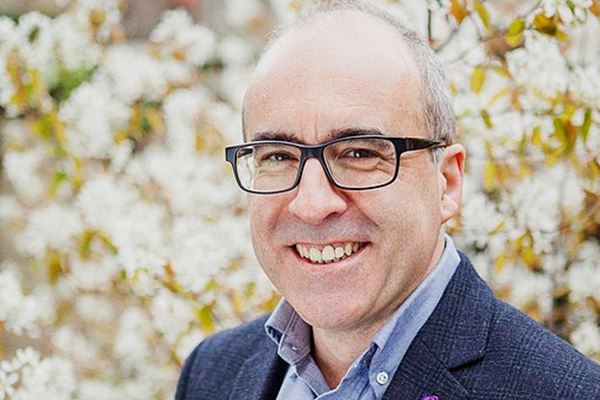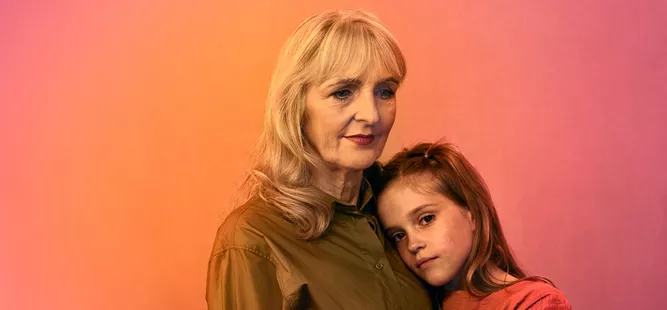The incredible story behind the lifesaving cancer drug olaparib
28th September 2019
To date, the cancer drug olaparib has been used to treat 75,000 patients around the world with certain ovarian, breast, pancreatic and prostate cancers. It's a truly lifesaving cancer treatment, one that exists thanks to the kindness and generosity of supporters like you. This is the incredible story of that journey.
Back in 1994 Worldwide Cancer Research first met Steve Jackson, a young enthusiastic professor at Cambridge University. Steve had a problem that he hoped the charity might be able to solve — his current research funding wouldn’t stretch to allow him to pursue an intriguing new avenue, and he had heard that the team at Worldwide Cancer Research were looking for bright, pioneering ideas that could lay the foundations for new cancer cures in the future.
Steve needed to find someone who would invest in him and Worldwide Cancer Research’s focus on discovery research sounded like the perfect fit for his work. So, he put pen to paper, and after weeks of suspense and several rigorous rounds of review by some of the world’s best scientists, a decision was made. Steve’s idea was going to be funded.
From an innovative idea to a potential new cancer cure.
Steve started studying how certain proteins in our cells fix DNA damage. Steve knew DNA is fragile and can break easily. The repair process (called DNA repair) is essential to keep our cells happy and healthy.
As his idea began to grow, Worldwide Cancer Research awarded Steve funds for an extra three projects. Finally, in 1997, Steve had a Eureka moment —that DNA repair deficiencies represented an Achilles heel for certain cancers that could potentially be exploited.
But even with a potential new cancer treatment, no pharmaceutical companies were showing any interest. This left Steve with no other option but to set up a start-up company of his own, called KuDOS.

KuDOS would go on to be the first stepping stone towards a promising new drug based on Steve's research. And after several years of development, testing and late nights in the lab, he and his team landed on a drug called olaparib.
KuDOS had neither the money nor the resources to run the type of large, complex clinical trial that would be needed to approve the drug for use in patients, so Steve decided to sell it, and KuDOS, to the global pharmaceutical company AstraZeneca, to guarantee a future for olaparib.
The decision paid off, as eight years later olaparib was finally approved in both the EU and US to treat patients with certain types of advanced ovarian cancer. And the success of the drug doesn't stop there, as new opportunities continue to emerge. Olaparib is also being tested in patients with certain types of pancreatic, prostate and breast cancer, with promising results. In the US, olaparib has already also been approved for the treatment of these cancers, whilst a decision of approval is pending in the UK.
Your support is saving lives
Thanks to these decisions, oncologists around the globe have suggested patients try the clinical trial. Olaparib is changing people's lives by helping those with cancer live longer and for some, they have received the life-changing news that they are now cancer free.
There’s no guarantee of success with clinical trials. The striking thing was that, within not too many months of those trials, certain patients were responding in some very pronounced and outstanding ways. I don’t tend to think of myself as a lifesaver. If I take a step back for a moment and think about what my research has led to, I guess that I am.Steve Jackson
We were only able to fund Steve’s research thanks to the generous support of our Curestarters. Together we can save lives by discovering the next cure, the next olaparib.

Further reading

I didn't think I would have any future - but olaparib gave me hope
Fiona and her husband looked forward to retiring together and often talked about their plans. But out of nowhere Fiona was diagnosed with advanced ovarian cancer, and their lives were turned completely upside down.
01 March 2023

What is olaparib?
Olaparib is the first in a new type of targeted cancer drug called a PARP inhibitor. The drug was developed thanks to pioneering research made possible by people just like you.
01 August 2020

Why is cancer so hard to cure?
This is a million, if not a billion, dollar question. With so much money spent on trying to find cures for cancer, why is there not a cure yet? Let’s explore the reasons why cancer is especially hard to cure, but also the reasons to be optimistic.
15 September 2022
